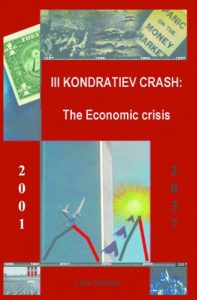This book, 3rd in the series on evolutionary economics, which applies biologic laws to explain the organic nature of the Industrial R=evolution, analyzes with historic depth the crisis, focusing in its temporal evolution and analogy with the 29 crisis.
It completes the work of Kondratieff, who studied the I wave of the Industrial Revolution of 'metal-bodies', steam machines and printed stocks, lead by England and Schumpeter who studied the 2nd wave of electrochemical engines, cars and ticker money lead by Germany.
After studying those historic cycles we analyze in depth, the 3rd wave of 'electronic heads of metal', chips, cameras, mobiles and e-money, lead by America; the 2008 crash of overproduction of those electronic machines and the future of those crisis, based in the causal parallelism with the previous ones. As all sciences are able to predict the future by prolonging the cycles of the past that will be repeated if its causes are repeated.
Luis Sancho is an economist and general systems scientist from Barcelona University, known by his biological, organic models of science.
This book is part of a series on biological models of history and economics. Those books written with increasing complexity ( 'depth of information' and 'extension in space') are:
- 'The economic ecosystem' is an introductory work written in a layman style, focused in the virtual economy (the financial system); its historic birth and the cultures that controls it.
- 'The evolution of machines' studies the physical economy of machines and its evolution and consequences for mankind.
- 'The people of the treasure' studies the history of the culture that founded capitalism and still rules it.
- 'The electronic crisis' studies the present crisis of overproduction of electronic machines and e-money.
- 'The III Kondratieff crash' studies that crisis with a historic perspective, comparing it to previous crisis.
- 'Fractal History' goes even deeper in the chronological study, extending the organic model to civilizations and historic cycles of evolution of war and social religions.
- 'Bio-History, Bio-Economics', the first book published on those models is an encyclopedic work that uses the original non-frills jargon of biology, logic and systems sciences to define the entire human adventure in its past, present and future.
It completes the work of Kondratieff, who studied the I wave of the Industrial Revolution of 'metal-bodies', steam machines and printed stocks, lead by England and Schumpeter who studied the 2nd wave of electrochemical engines, cars and ticker money lead by Germany.
After studying those historic cycles we analyze in depth, the 3rd wave of 'electronic heads of metal', chips, cameras, mobiles and e-money, lead by America; the 2008 crash of overproduction of those electronic machines and the future of those crisis, based in the causal parallelism with the previous ones. As all sciences are able to predict the future by prolonging the cycles of the past that will be repeated if its causes are repeated.
Luis Sancho is an economist and general systems scientist from Barcelona University, known by his biological, organic models of science.
This book is part of a series on biological models of history and economics. Those books written with increasing complexity ( 'depth of information' and 'extension in space') are:
- 'The economic ecosystem' is an introductory work written in a layman style, focused in the virtual economy (the financial system); its historic birth and the cultures that controls it.
- 'The evolution of machines' studies the physical economy of machines and its evolution and consequences for mankind.
- 'The people of the treasure' studies the history of the culture that founded capitalism and still rules it.
- 'The electronic crisis' studies the present crisis of overproduction of electronic machines and e-money.
- 'The III Kondratieff crash' studies that crisis with a historic perspective, comparing it to previous crisis.
- 'Fractal History' goes even deeper in the chronological study, extending the organic model to civilizations and historic cycles of evolution of war and social religions.
- 'Bio-History, Bio-Economics', the first book published on those models is an encyclopedic work that uses the original non-frills jargon of biology, logic and systems sciences to define the entire human adventure in its past, present and future.






